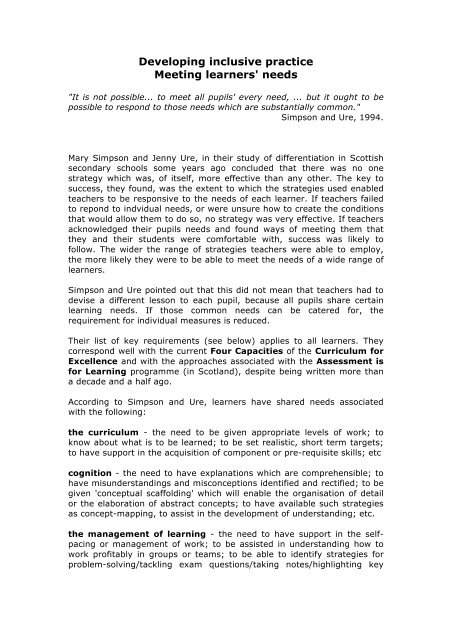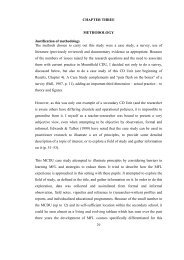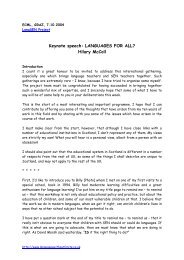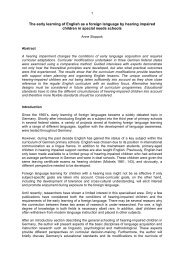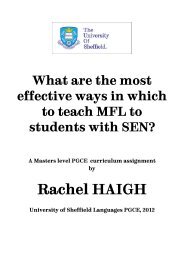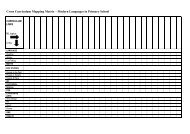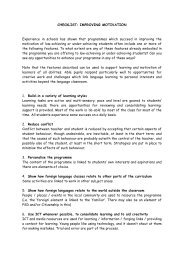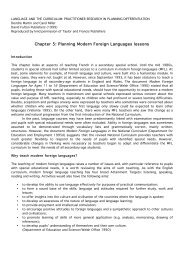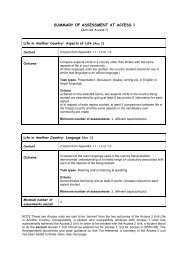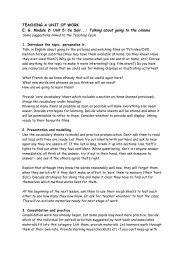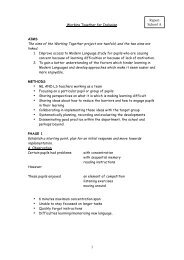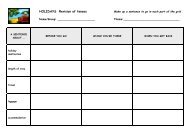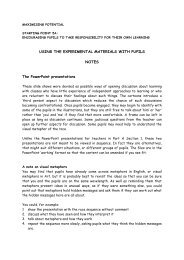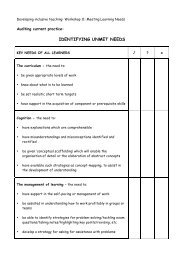'Meeting learners' needs' - Languages Without Limits
'Meeting learners' needs' - Languages Without Limits
'Meeting learners' needs' - Languages Without Limits
- No tags were found...
You also want an ePaper? Increase the reach of your titles
YUMPU automatically turns print PDFs into web optimized ePapers that Google loves.
Developing inclusive practiceMeeting <strong>learners'</strong> needs"It is not possible... to meet all pupils' every need, ... but it ought to bepossible to respond to those needs which are substantially common."Simpson and Ure, 1994.Mary Simpson and Jenny Ure, in their study of differentiation in Scottishsecondary schools some years ago concluded that there was no onestrategy which was, of itself, more effective than any other. The key tosuccess, they found, was the extent to which the strategies used enabledteachers to be responsive to the needs of each learner. If teachers failedto repond to indvidual needs, or were unsure how to create the conditionsthat would allow them to do so, no strategy was very effective. If teachersacknowledged their pupils needs and found ways of meeting them thatthey and their students were comfortable with, success was likely tofollow. The wider the range of strategies teachers were able to employ,the more likely they were to be able to meet the needs of a wide range oflearners.Simpson and Ure pointed out that this did not mean that teachers had todevise a different lesson to each pupil, because all pupils share certainlearning needs. If those common needs can be catered for, therequirement for individual measures is reduced.Their list of key requirements (see below) applies to all learners. Theycorrespond well with the current Four Capacities of the Curriculum forExcellence and with the approaches associated with the Assessment isfor Learning programme (in Scotland), despite being written more thana decade and a half ago.According to Simpson and Ure, learners have shared needs associatedwith the following:the curriculum - the need to be given appropriate levels of work; toknow about what is to be learned; to be set realistic, short term targets;to have support in the acquisition of component or pre-requisite skills; etccognition - the need to have explanations which are comprehensible; tohave misunderstandings and misconceptions identified and rectified; to begiven 'conceptual scaffolding' which will enable the organisation of detailor the elaboration of abstract concepts; to have available such strategiesas concept-mapping, to assist in the development of understanding; etc.the management of learning - the need to have support in the selfpacingor management of work; to be assisted in understanding how towork profitably in groups or teams; to be able to identify strategies forproblem-solving/tackling exam questions/taking notes/highlighting key
points/revising etc; to develop a strategy for asking for assistance withproblems; etc.motivational factors - the need to be motivated to learn; to expectsuccess and progression in learning; to be confident; to expect problemsto be capable of resolution; to have high but attainable goals; torecognise purpose in the learning process; to value the skills andknowledge acquired in school and to have an expectancy that these are aspringboard for future learning; etc.personal factors - the need to have idiosyncratic personal issues takennote of, eg times of crisis or stress; to have personal circumstances takeninto account, eg lack of facilities for doing homework, lack of parentalsupport or encouragement; to have assistance with improving personaland inter-personal skills; low self-esteem etc; to have help in dealing withpeer group pressure etc.Simpson, M. and Ure, J. What's the Difference? A study of differentiationin Scottish secondary schools.Northern College Publications, 1994 (page 85)http://www.languagewithoutlimits.co.uk


